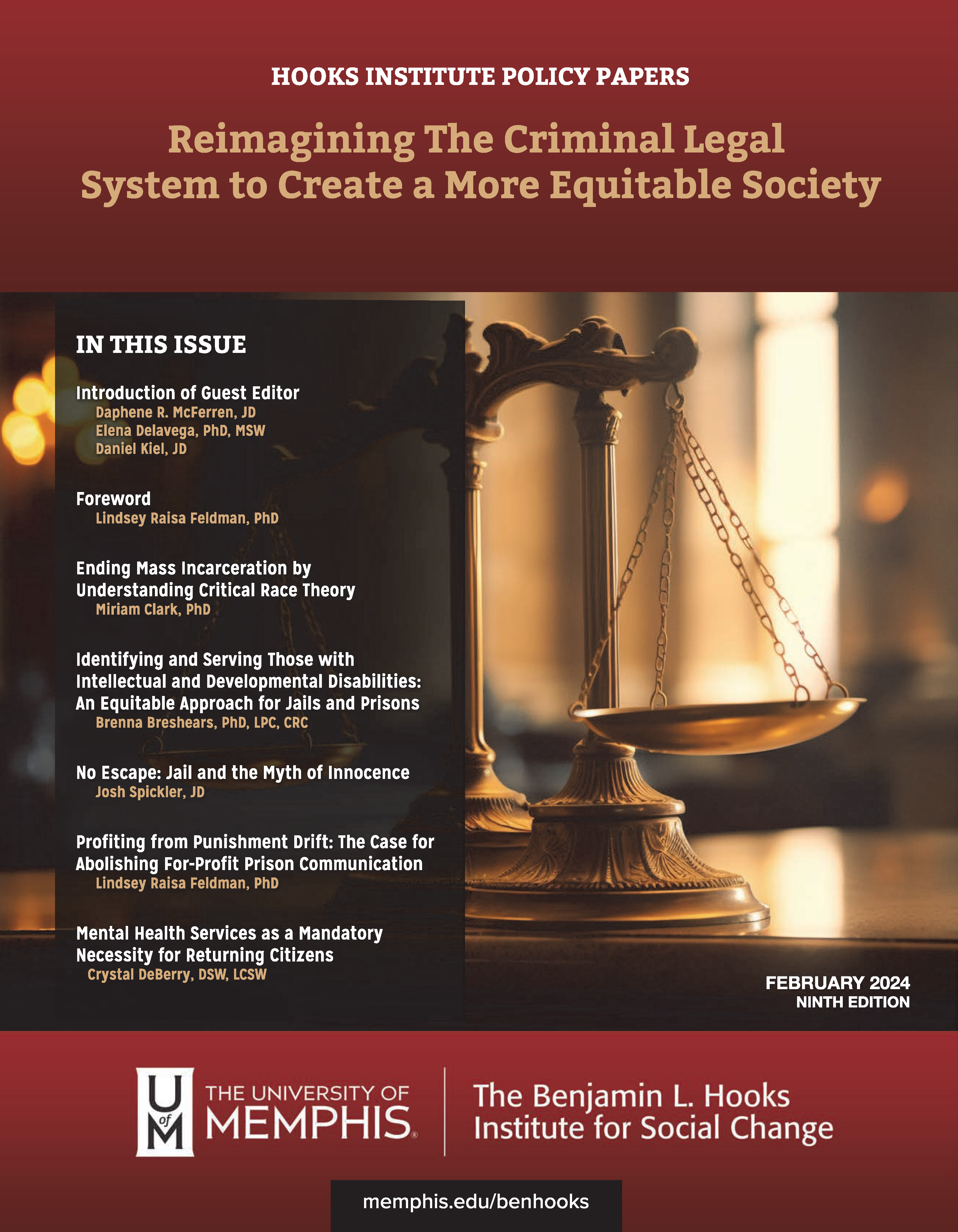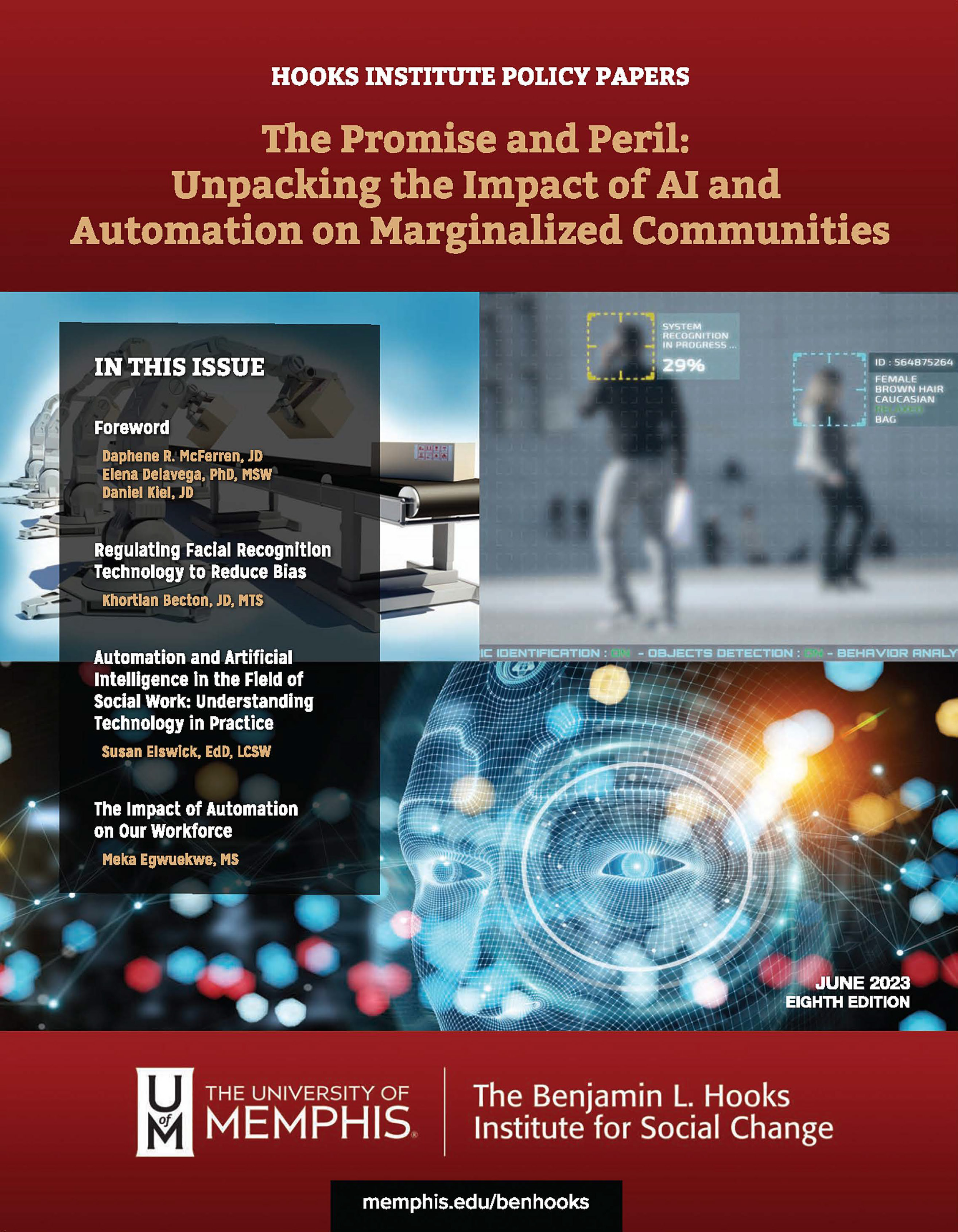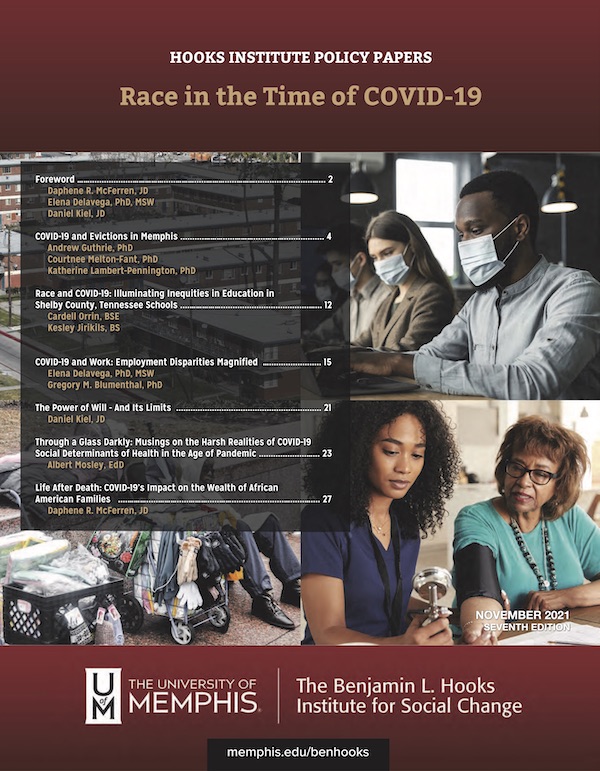The Benjamin L. Hooks Institute for Social Change
Hooks Policy Papers
The Hooks Institute Policy Papers use national conversations about critical civil and human rights issues as a starting point to discuss and propose solutions to, contemporary issues of race, class, public policy, and social justice.
Printed copies of the Hooks Institute Policy Papers are available. Contact bhievents@memphis.edu for details.
2024
Reimagining The Criminal Legal System to Create a More Equitable Society

The policy papers in this edition help us begin to answer Ruth Wilson Gilmore’s pertinent question: “Instead of asking whether anyone should be locked up or go free, why don’t we think about why we solve problems by repeating the kind of behavior that brought us the problem in the first place?”
The series is arranged intentionally to engage with the criminal legal system from beginning to end—from its roots, to its policies and ideologies, to its lasting effects. Each paper focuses on one critical issue in the criminal legal system in the United States, and then presents a set of policy recommendations that could lead to real change.
- In the paper titled “Ending Mass Incarceration by Understanding Critical Race Theory,” Dr. Miriam Clark, a Research Associate at the Oregon Social Learning Center, describes why it is imperative we face systemic racism head-on when reimagining the criminal legal system.
- The next policy paper moves us from the systemic causes of mass incarceration to a person’s initial contact with the criminal legal system, that of policing and the courts. Dr. Brenna Breshears, Assistant Professor of Clinical Mental Health Counseling at Eastern Michigan University, writes the paper titled “Identifying and Serving Those with Intellectual and Developmental Disabilities: An Equitable Approach for Jails and Prisons.”
- Moving further into the vast criminal legal system, the next policy paper encourages us to understand and advocate for change regarding jail practices in Shelby County, TN. The criminal legal system is a complex multi-stage process, and jails theoretically exist within this process to detain individuals before they are sentenced. Yet as Josh Spickler, Executive Director of the Memphis nonprofit Just City, describes in “No Escape: Jail and the Myth of Innocence,” the actual role of jail has come to serve as a site of sanctioned violence and harm far beyond its stated purpose.
- Dr. Lindsey Raisa Feldman, Assistant Professor of Anthropology at the University of Memphis, in the paper titled “Profiting from Punishment Drift: The Case for Abolishing For-Profit Prison Communication,” describes the experience of social isolation for families of incarcerated loved ones. Drawing on ethnographic research with women in Memphis, TN, she argues that charging fees for communication between prison and the outside world causes undue harm, and calls to undo the for-profit communication regime currently at work in U.S. prisons. Although there are many features of the U.S. prison system that must be addressed, Dr. Feldman underscores that communication is fundamental to humanity, which is stripped away in this current era of mass incarceration.
- In her paper titled “Mental Health Services as a Mandatory Necessity for Returning Citizens,” Dr. Crystal DeBerry, Owner of DeNovo Clinical Strategies LLC and Founder of the Memphis nonprofit Indomitable Families Affected by Incarceration, describes the importance of mental health resources and support for those impacted by incarceration. She argues that wrap-around mental health services, including counseling, supportive programs, and support for families of incarcerated loved ones, should be a mandatory component of reentry. Just as the first paper makes clear that mass incarceration begins far before any individual person is imprisoned, this paper underscores the fact that the criminal legal system does not simply end when a person is released from detention. The effects of the criminal legal system are vast and long-lasting.
2023
The Promise and Peril: Unpacking the Impact of AI and Automation on Marginalized Communities
Read the 2023 Policy Papers >
The 2023 Policy Papers analyze the impact of AI and automation on marginalized communities in three crucial areas.
- In "Regulating Facial Recognition Technology to Reduce Bias" Khortlan Becton, JD, MTS, explores the urgent need to regulate AI to eradicate existing and potential policies and practices that dispro-portionately discriminate against African Americans and minorities. Becton proposes the creation of a new federal agency to regulate AI.
- In "Automation and Artificial Intelligence in the Field of Social Work: Understanding Technology in Practice" Susan Elswick, EdD, LCSW, a faculty member in the University of Memphis School of Social Work, seeks a path to us-ing AI and Automation to provide social work counseling to those in need. Elswick not only explores how effective cli-ent counseling is dependent upon access and ability to use technology by clients but also argues that social workers require formal training from institutions of higher learning on how to use AI and automation to benefit their clients.
- In "The Impact of Automation on Our Workforce" Meka Egwuekwe, MS, founder and executive director of Code Crew, approaches AI and automation from the per-spective of a practitioner who teaches others to write computer code. Recognizing that the world is experiencing a revolution in how work is performed, Egwuekwe proposes recommendations that reskill or upskill the workforce, increased support for startups and small businesses, and a societal framework that will embrace universal basic income as a resource to aid those displaced by AI and Automation.
2021
Hooks Institute Policy Papers Presentation: "Race in the Time of COVID"
Race in the time of COVID-19 assesses the impact of the pandemic on exacerbating educational, health, and employment inequalities and the loss of intergenerational wealth among African Americans who have disproportionately died because of COVID-19.
The Hooks Institute 2021 Policy Papers address the myriad ways that the ongoing global health crisis has exposed existing injustices in our society, including:
- "COVID-19 and Evictions in Memphis" by Andrew Guthrie (UofMemphis City and Regional Planning), Courtnee Melton-Fant (UofMemphis Division of Health Systems Management and Policy) and Katherine Lambert-Pennington (UofMemphis Department of Anthropology) reveals pockets of social marginalization and economic vulnerability in Shelby County, focusing on susceptibility to evictions.
- "Race and COVID: Illuminating Inequities in Education" by Cardell Orrin (Stand for the Children) and Kelsey Jirikils (Freedom Preparatory Academy) highlights how the pandemic more clearly revealed the vast disparities in resources available to students throughout Shelby County.
- "COVID-19 and Work: Employment Disparities Magnified" by Elena Delavega (UofMemphis Department of Social Work) and Gregory M. Blumenthal (GMBS Consulting) quantifies how the pandemic's work disruptions fell most harshly on the most vulnerable, a group made up disproportionately of racial and ethnic minorities.
- "COVID-19 Reveals the Power - and Limits - of Collective Will" by Daniel Kiel (UofMemphis Law School) examines the emergency policy responses to the pandemic's most urgent social needs, such as evictions and unemployment benefits and how it took the shocks of COVID-19 to make them viable policy options.
- "Through a Glass Darkly: Musings on the Harsh Realities of COVID-19 Social Determinants of Health in the Age of Pandemic" by Albert Mosley (Methodist Le Bonheur Healthcare)" highlights racial disparities in hospitalizations, mortalities, and vaccination rates, lamenting that such distressing statistics were entirely predictable given community history with systemic racism that ensured economic and educational disparities.
- "Life After Death: COVID-19's Impact on the Wealth of African American Families" by Daphene R. McFerren (Hooks Institute) describes the deterioration of wealth that results when individuals pass away without a will or proper direction as to how to distribute their estate, a problem made tragically more vital during the pandemic.
2020
Let Every Voice Be Heard: Protecting the Right to Vote and American Democracy
- Shanna Singh Hughey and Dawn Schluckebier "Voting with Conviction: Voting Rights and Voting Restoration in Tennessee"
- Mitchell Brown "The Criminalization of the Ballot Box: Navigating the Rise of Voter Prosecutions, Charting a Path of Resistance"
- Rev. Earle Fisher and Sijuwola Crawford "#UPTheVote901 and the Fight for Democracy in Memphis/Shelby County"
2019
Land, Economic Mobility and Race | The Tale of Two Nations: One Rich, One Poor | Hooks Institute Open House and Policy Papers Presentation
- “A Memphis Mirage: How Home Mortgage Alternatives and Increased Equity Firm Ownership Diminish Wealth in Low-Income Communities” by Wade Rathke (founder of the Association of Community Organizations for Reform Now) and Diné Butler examines how large equity firms diminished home wealth in low-income neighborhoods in Memphis and the nation in the years following the Great Recession.
- “Workplace Setting and Job Types as Detriments of Health Disparities” by Dr. Shelly White-Means (University of Tennessee Health Science Center) looks at the impact of workplace settings and job types on health disparities.
- “Economic Challenges Facing Black Men and Boys” by William R. Emmons, Ana H. Kent and Lowell R. Ricketts (Federal Reserve Bank of St. Louis) identifies solutions to create, sustain and advance the economic mobility of men and boys of color, who are more likely to experience downward economic mobility even if born into wealth. The views expressed do not reflect official positions of the Federal Reserve Bank of St. Louis or the Federal Reserve System.
2018
Climbing Out from Under the Rock: Restoring Civil Rights, Economics, and Social Justice in Memphis and the Nation
- Daniel Kiel, JD. The Dangers of a Fragmented Educational Landscape in Shelby County
- Demetria D. Frank, JD. Implicit Bias and Disproportionate Minority Contact in the Shelby County Juvenile
Court System
- Daphene R. McFerren, JD; Elena Delavega, PhD. The Robots Are Ready! Are We? Automation, Race, and the Workforce
- Ana L. Leech, MD. Race and Poverty: Disparities in Healthcare at the End of Life
2017
Bending the Arc Toward Justice: Including the Excluded. 2017 Hooks Institute Policy Papers
- Michael R. Duke, PhD. Immigrants in Small Cities: Opportunities and Challenges
- Peter A. Kindle, PhD, CPA, LMSW. Welfare Dependency and Extractive Economies: Lessons Learned from Pine Ridge
- Idia B. Thurston, PhD. Prioritizing Lesbian, Gay, Bisexual, and Transgender Lives in the Era of Resistance and Prejudicial Rhetoric
- Nabil A. Bayakly,PhD. Memphis and Islam: Integrating Muslims and Islam into the Community Fabric
- Daphene R. McFerren, JD; Elena Delavega,PhD, MSW, Executive Summary
2016
Race, Class, and Social Justice in Memphis: A Call to Bridge the Great Divide. 2016 Hooks Institute Policy Papers
- Charles A. Santo, PhD. Transportation, Urban Form, and Social Justice in Memphis
- Simone Tulumello, PhD. The Long Way to a Safer Memphis: Local Policies for Crime Prevention Needs Structural Change
- Eric Groenendyk, PhD. Ideology and Division: How We Got Here, How Do We Get Back? The Search for Unity
- Daphene R. McFerren, JD; Elena Delavega,PhD, MSW. Executive Summary
2014
A Call for Collective Action: Tackling Social Challenges in Memphis. 2014 Hooks Institute Policy Papers
- Gregory Washington, PhD, MSW. What are the Social Conditions that Contribute to the Disproportionate Confinement of Young African-American Males in Memphis?
- Elena Delavega, PhD, MSW. Pouring Water on the Wicked Poverty of the Mid-South: Educating a Quality Workforce
- John Gnuschke, PhD. Fifty Years of Progress but Only Halfway Home

